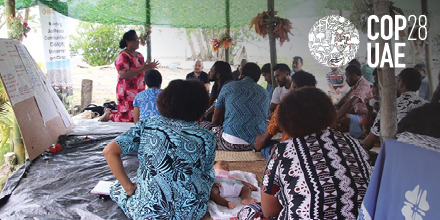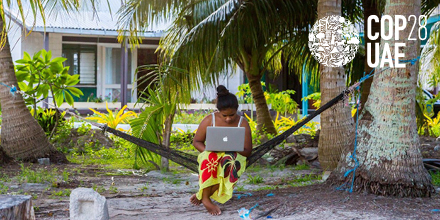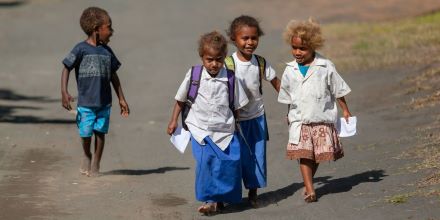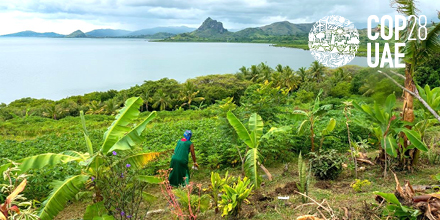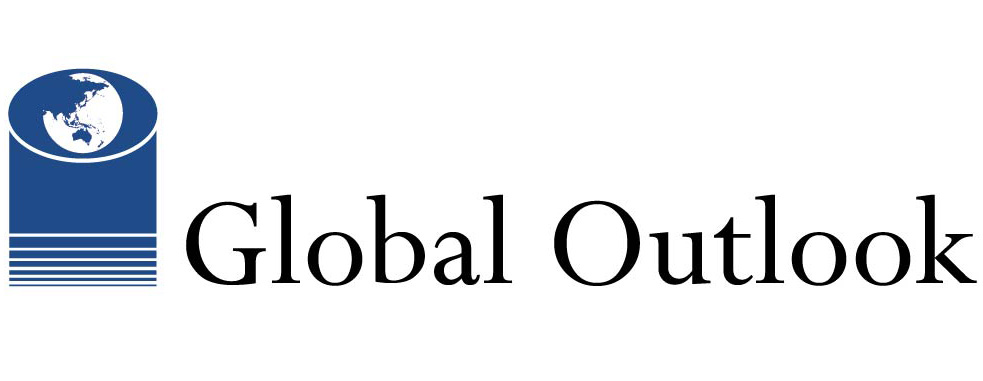
Curated expert opinion on intractable contemporary issues
Global Outlook: Climate Change and Conflict
Building Peace Amidst Climate Challenges: Insights from Conciliation Resources
By Mercy Masta | 19 November, 2023
Pursuing global ambitions for peace, gender equality and inclusion within a changing climate has rarely seemed so perilous. Yet more than ever, we're aware that these goals are connected and even complementary.
A New Pacific Diplomacy for COP28
By George Carter | 17 November, 2023
Pacific Islanders should not leave the COP forum to others; they can use COPs to feed Pasifika knowledge, culture and approaches into the global agenda and thus become a force for climate justice.
COP28 and the Unaccounted Loss and Damage for Pacific Youth
By Ria Shibata | 14 November, 2023
At COP28 the issue of loss and damage must be addressed. It is within this context that the voices of the Pacific youth become absolutely indispensable.
This is not Climate Justice: The Australia-Tuvalu Falepili Union
By Taukiei Kitara and Carol Farbotko | 13 November, 2023
Australia is making headlines around the world for offering the people of Tuvalu a new ‘human mobility pathway named the Australia-Tuvalu Falepili Union. Tuvaluans have not been consulted on this plan.
Pacific Security: Whose Strategy Is It?
By Maima Koro | 09 November, 2023
Security agreements have become an important measure of the close relationship between global partners and Pacific Island states. In geopolitics, this 'close relationship' is usually another way of saying partners have influence, control or power over Pacific countries.
Between a Rock and a Hard Place
By John R. Campbell | 07 November, 2023
There are challenges to the narrative of climate change as an existential crisis for Pacific Island countries, including a rejection of the forced migration scenario that has been painted by international media and other external observers, especially for atoll populations.
The views and opinions expressed in Global Outlook are those of the authors and do not necessarily reflect the official policy or position of Toda Peace Institute.
Building Peace Amidst Climate Challenges: Insights from Conciliation Resources
By Mercy Masta | 19 November, 2023
Pursuing global ambitions for peace, gender equality and inclusion within a changing climate has rarely seemed so perilous. Yet more than ever, we're aware that these goals are connected and even complementary.
A New Pacific Diplomacy for COP28
By George Carter | 17 November, 2023
Pacific Islanders should not leave the COP forum to others; they can use COPs to feed Pasifika knowledge, culture and approaches into the global agenda and thus become a force for climate justice.
COP28 and the Unaccounted Loss and Damage for Pacific Youth
By Ria Shibata | 14 November, 2023
At COP28 the issue of loss and damage must be addressed. It is within this context that the voices of the Pacific youth become absolutely indispensable.
This is not Climate Justice: The Australia-Tuvalu Falepili Union
By Taukiei Kitara and Carol Farbotko | 13 November, 2023
Australia is making headlines around the world for offering the people of Tuvalu a new ‘human mobility pathway named the Australia-Tuvalu Falepili Union. Tuvaluans have not been consulted on this plan.
Pacific Security: Whose Strategy Is It?
By Maima Koro | 09 November, 2023
Security agreements have become an important measure of the close relationship between global partners and Pacific Island states. In geopolitics, this 'close relationship' is usually another way of saying partners have influence, control or power over Pacific countries.
Between a Rock and a Hard Place
By John R. Campbell | 07 November, 2023
There are challenges to the narrative of climate change as an existential crisis for Pacific Island countries, including a rejection of the forced migration scenario that has been painted by international media and other external observers, especially for atoll populations.
The views and opinions expressed in Global Outlook are those of the authors and do not necessarily reflect the official policy or position of Toda Peace Institute.
